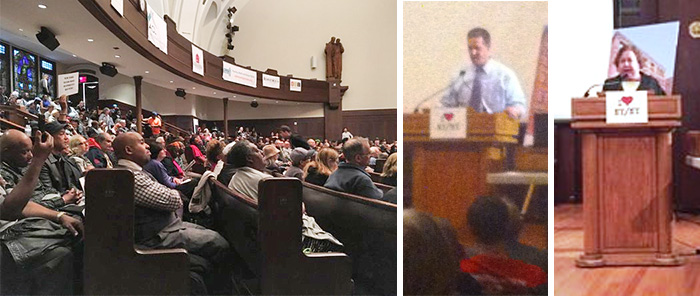Amida Care Joins Campaign 4 NY/NY Housing for a Healthier New York
octubre 23 2015
Amida Care joins the Campaign 4 NY/NY Housing, calling on Governor Cuomo to launch a new statewide supportive housing agreement to create 35,000 new housing units (30,000 units in New York City and 5,000 units outside New York City). The units would be created over the next 10 years in partnership with NYC and localities with large and growing homeless populations.
On October 23, Amida Care participated in a forum at the New York Society for Ethical Culture. With production of new units under the current NY/NY III City-State supportive housing initiative coming to an end, over 400 elected officials, housing providers, faith leaders, current and former homeless individuals, and supporters came together to advocate for a new NY/NY IV housing agreement.
Homelessness in New York has nearly doubled in the last decade. One out of every seven homeless people in the U.S. lives in New York, with approximately 67,000 people staying in shelters. In NYC alone, over 57,000 people, including over 22,000 children, stay in homeless shelters. Thousands more not included in this estimate sleep on the streets or in abandoned buildings.
Supportive housing pairs affordable housing with on-site supportive services and has proven to be the most cost-effective and successful strategy to solve homelessness for those with the greatest needs, including individuals living with chronic health conditions, mental illness, and substance use, as well as families living with disabilities. There are too few supportive housing units available to meet the current need, as four out of every five people eligible for supportive housing in New York City have had to stay in a shelter or on the street.
Several city and state officials attended the forum and made remarks in support of NY/NY IV, including State Senator Liz Krueger; Assembly Members Richard Gottfried (Chair of the Committee on Health), Andrew Hevesi (Chair of the Committee on Social Services), and Keith Wright (Chair of the Committee on Housing); and Manhattan Borough President Gail Brewer.
“Supportive housing is the fundamental solution to solving the homeless crisis in New York State,” said Hevesi. “Supportive housing reduces the use of shelters, visits to detoxification centers, hospitalizations, emergency room use, and incarceration, and therefore saves taxpayers money.”
Several impressive outcomes have resulted from supportive housing:
- An average net public savings of $10,100 per unit per year by reducing the use of shelters, hospitals, psychiatric centers, and incarceration;
- A 47% decrease in chronic homelessness among single adults in the first five years of the NY/NY III agreement;
- Increased stability, with over 85% of NY/NY III tenants remaining housed after one year;
- A rise in real estate values for properties located closest to supportive housing developments.
“Supportive housing is at the heart of creating a healthier New York,” said Doug Wirth, President and CEO of Amida Care. “Social determinants such as unstable housing, food insecurity, and stigma have a direct, adverse impact on the health and well-being of communities. Amida Care has long understood how eliminating barriers to care leads to life-saving health outcomes and significant cost savings.”
Amida Care’s Homeless Outreach, Management and Empowerment (HOME) program assists members who are homeless or at risk of homelessness and connects them to vital health and social services. HOME offers a single point of contact for people who are homeless and the providers that care for them, assistance to find special needs housing, outreach to bring people in from the streets, and other services. HOME also arranges individualized care plans with all the services available through Amida Care, such as linkage to counseling, mental and behavioral health services, arrangements for substance abuse and recovery services, job training and placement support, and more. Many HOME members suffer from multiple challenges, including having mental health and substance use issues. The HOME Team coordinates supports for members to stay housed and manage their lives. This often results in decreased overall public costs by reducing emergency room visits and lengthy hospital stays.
“Supportive housing is an essential component of a sensible health program to improve outcomes and control health care costs,” said Gottfried. “Supportive housing is the ‘miracle drug’ for people to stay healthy and out of hospitals.”


